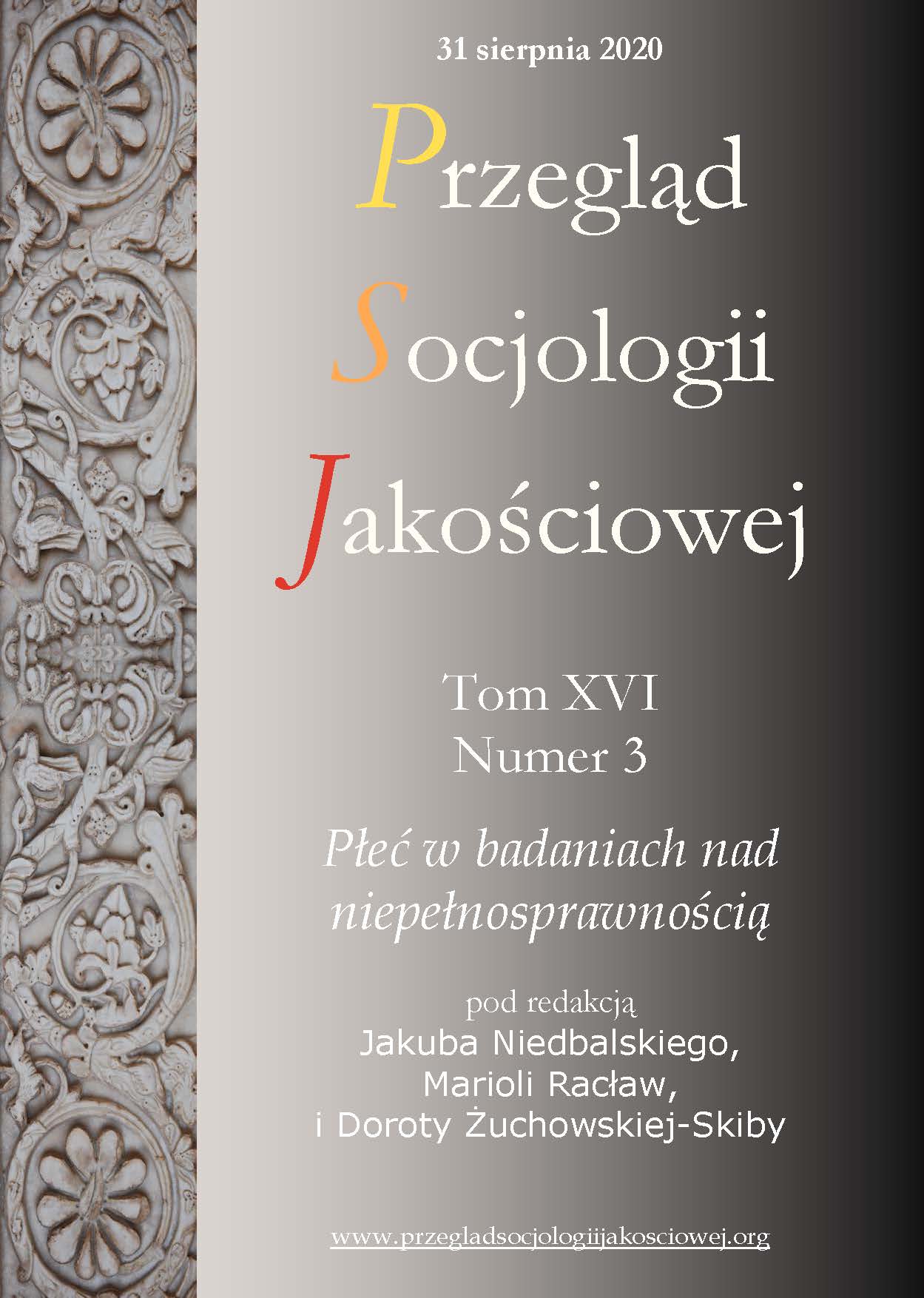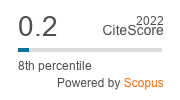Laicy jako rzecznicy. Opinie osób niepełnosprawnych jako głos w polemice toczonej przez reprezentantów socjologii medycyny i studiów nad niepełnosprawnością
DOI:
https://doi.org/10.18778/1733-8069.16.3.06Słowa kluczowe:
socjologia medycyny, studia nad niepełnosprawnością, niepełnosprawność, badania jakościoweAbstrakt
W drugiej połowie dwudziestego wieku tematyka niepełnosprawności stała się przedmiotem debat akademickich i badań empirycznych prowadzonych na gruncie nauk społecznych w ramach dwóch równolegle rozwijających się nurtów. W pierwszym z nich – socjologii medycyny (medical sociology), uwagę koncentrowano na naturze i przyczynach chorób przewlekłych i niepełnosprawności, stawiając w centrum zainteresowania szeroko rozumiane dysfunkcje zdrowotne, interpretowane najczęściej w ujęciu indywidualnym. W drugim nurcie – studiach nad niepełnosprawnością (disability studies), uwaga badaczy skupiała się przede wszystkim na problemach społecznych (model społeczny) jako źródle niepełnosprawności oraz na adekwatnych im środkach zaradczych. W modelu społecznym niepełnosprawność traktowano przede wszystkim jako pochodną szeroko rozumianych ograniczeń zewnętrznych, a nie jako konsekwencję dysfunkcji na poziomie organizmu. Celem artykułu jest przybliżenie założeń teoretycznych tych dwóch nurtów z jednoczesnym uwzględnieniem opinii osób niepełnosprawnych, jako głosu uzupełniającego argumentację w toczonej dyskusji. Opinie na temat istoty własnej niepełnosprawności, jej źródeł i konsekwencji wyrażone zostały przez 45 osób niepełnosprawnych, które wzięły udział w badaniach terenowych zrealizowanych z wykorzystaniem techniki indywidualnych wywiadów pogłębionych. Uczestnicy badania na ogół interpretowali swoją niepełnosprawność i jej przyczyny w perspektywie medycznej (indywidualistycznej). Samą dysfunkcję traktowali jako fundamentalną dla budowania statusu centralnego, w mniejszym stopniu przypisując przyczyny swojej niepełnoprawności uwarunkowaniom społecznym.
Pobrania
Bibliografia
Albrecht L. Gary (2010) The Sociology of Disability: Historical Foundations and Future Directions [w:] Chloe E. Bird et al., eds., Handbook of Medical Sociology. Sixth Edition. Nashville: Vanderbilt University Press, s. 192–209.
Google Scholar
DOI: https://doi.org/10.2307/j.ctv16h2n9s.15
Albrecht L. Gary, Seelman Katherine D., Bury Michael (2001) Introduction: The Formation of Disability Studies [w:] Gary L. Albrecht, Katherine D. Seelman, Michael Bury, eds., Handbook of Disability Studies. Thousand Oaks, London, New Delhi: Sage Publications, s. 1–8.
Google Scholar
DOI: https://doi.org/10.4135/9781412976251.n1
Anderson Timothy W., Helm David T. (1979) The Physician-Patient Encounter: A Process of Reality Negotiation [w:] Jaco E. Gartly, ed., In Patients, Physicians, and Illness, New York: Free Press, s. 259–271.
Google Scholar
Barnes Colin, Thomas Carol (2006) Introduction [w:] Len Barton, ed., Overcoming Disabling Barriers. 18 years of Disability and Society. London, New York: Routledge, s. 3–6.
Google Scholar
Bloom Samuel W. (2002) The Word as Scalpel. A History of Medical Sociology. New York: Oxford University Press.
Google Scholar
Bury Michael (1982) Chronic illness as biographical disruption. „Sociology of Health and Illness”, vol. 2, s. 167–182.
Google Scholar
DOI: https://doi.org/10.1111/1467-9566.ep11339939
Campbell Kumari Fiona (2001) Inciting legal fictions: Disability’s date with ontology and the ableist body of the law. „Griffith Law Review”, vol. 10, s. 42–62.
Google Scholar
Campbell Kumari Fiona (2009) Disability Harms: Exploring Internalized Ableism [w:] Catherine A. Marshall et al. , eds., Disabilities. Insights from across Fields and around the World. Westport: Praeger Publishers, s. 19–33.
Google Scholar
Charmaz Kathy (1983) Loss of self: a fundamental form of suffering in the chronically ill. „Sociology of Health and Illness”, vol. 2, s. 168–195.
Google Scholar
DOI: https://doi.org/10.1111/1467-9566.ep10491512
Cockerham William C. (2001) Medical Sociology and Sociological Theory [w:] William C. Cockerham, ed., The Blackwell Companion to Medical Sociology. Malden, Oxford: Blackwell Publishers, s. 3–22.
Google Scholar
DOI: https://doi.org/10.1111/b.9781405122665.2004.00003.x
Cockerham William C. (2016) Medical Sociology. Thirteenth Edition. London, New York: Routledge.
Google Scholar
DOI: https://doi.org/10.4324/9781315618692
Conrad Peter, Schneider Joseph W. (1992) Deviance and Medicalization. From Badness to Sickness. Philadelphia: Temple University Press.
Google Scholar
ESS Round 9: European Social Survey Round 9 Data (2018) Data file edition 1.1. NSD – Norwegian Centre for Research Data, Norway – Data Archive and distributor of ESS data for ESS ERIC.
Google Scholar
European Communities (2001) Disability and social participation in Europe. Luxembourg: Office for Official Publications of the European Communities.
Google Scholar
Freidson Eliot (1970) Profession of Medicine. A Study of the Sociology of Applied Knowledge. New York: Dodd, Mead & Company.
Google Scholar
French Sally, Swain John (2008) There but for Fortune [w:] John Swain, Sally French, eds., Disability on Equal Terms. Los Angeles, London, New Delhi, Singapore: Sage Publications, s. 7–20.
Google Scholar
DOI: https://doi.org/10.4135/9781446213261.n2
Gabe Jonathan, Bury Mike, Elston Mary Enn (2004) Key Concepts in Medical Sociology. London, Thousand Oaks, New Delhi: Sage Publications.
Google Scholar
Goodley Dan (2011) Disability Studies. An Interdisciplinary Introduction. New Delhi; Sage Publications.
Google Scholar
Haveman Meindert (2006) Aging, International [w:] Gary. L. Albrecht, ed. Encyclopedia of Disability. Volume I. Thousand Oaks: Sage Publications, s. 78–84.
Google Scholar
Horobin Gordon (1985) Review Essay: Medical sociology in Britain: true confessions of an empiricist. „Sociology of Health and Illness”, vol. 1, s. 94–107.
Google Scholar
DOI: https://doi.org/10.1111/1467-9566.ep10831386
ICIDH (1980) International Classification of Impairments, Disabilities, and Handicaps. Geneva: World Health Organization.
Google Scholar
ICIDH-2 (2001) International Classification of Functioning Disabilities, and Health. Geneva: World Health Organization.
Google Scholar
Levine Sol (1987) The Changing Terrains in Medical Sociology: Emergent Concern with Quality of Life. „Journal of Health and Social Behavior”, vol. 1, s. 1–6.
Google Scholar
DOI: https://doi.org/10.2307/2137136
Masłyk Tomasz (2019) Po pierwsze człowiek. Kapitał społeczny osób niepełnosprawnych w Polsce. Warszawa: Wydawnictwo Naukowe Scholar.
Google Scholar
Mishler Elliot G. (1984) The Discourse of Medicine: Dialectics of Medical Interviews. Norwood, NJ: Ablex.
Google Scholar
Nagi, Saad Z. (1965) Some conceptual issues in disability and rehabilitation [w:] Marvin B. Sussman, ed., Sociology and rehabilitation. Washington, DC: American Sociological Association, s. 100–113.
Google Scholar
Oliver Michael (1996) DefiningImpairment and Disability, Issues at Stake [w:] Colin Barnes, Geof Mercer, eds., Exploring the Divide. Illness and Disability. Leeds: Leeds University Press, s. 29–54.
Google Scholar
Oliver Michael (2006) If I had a hammer: the social model in action [w:] John Swain et al., eds., Disabling Barriers – Enabling Environments. London: Sage Publications, s. 7–12.
Google Scholar
Ostrowska Antonina (2009) Niepełnosprawność, rehabilitacja i integracja społeczna osób niepełnosprawnych [w:] Antonina Ostrowska, red., Socjologia medycyny. Podejmowane problemy, kategorie analizy. Warszawa: Wydawnictwo IFiS PAN, s. 146–171.
Google Scholar
Pfeiffer David (2000) The devils are in the details: the ICIDH2 and the disability movement. „Disability and Society”, vol. 7, s. 1079–1082.
Google Scholar
DOI: https://doi.org/10.1080/713662020
PZN (2015) Niewidomy, słabowidzący, ociemniały, tracący wzrok. Definicje, różnice. Polski Związek Niewidomych [dostęp 14 kwietnia 2018 r.]. Dostępny w Internecie: http://pzn.org.pl/niewidomy-ociemnialy-slabowidzacy-tracacy-wzrok-definicje-roznice
Google Scholar
Scambler Graham, Scambler Sasha, eds., (2010) New Directions in the Sociology of Chronic and Disabling Conditions Assaults on the Lifeworld. New York: Palgrave Macmillan.
Google Scholar
DOI: https://doi.org/10.1057/9780230297432
Shakespeare Tom, Watson Nick (2010) Beyond Models: Understanding the Complexity of Disabled People’s Lives [w:] Graham Scambler, Sasha Scambler, eds., New Directions in the Sociology of Chronic and Disabling Conditions Assaults on the Lifeworld. Basingstoke, New York: Palgrave Macmillan, s. 57–76.
Google Scholar
DOI: https://doi.org/10.1057/9780230297432_4
Skrzypek Michał (2013) Wstęp [w:] Michał Skrzypek, red., Socjologia medycyny w multidyscyplinarnych badaniach humanizujących biomedycynę. Lublin: Wydawnictwo KUL, s. 5–29.
Google Scholar
Snyder Sharon L. (2006) Disability Studies [w:] Gary L. Albrecht, ed., Encyclopedia of Disability. Volume I. Thousand Oaks: Sage Publications, s. 478–490.
Google Scholar
Sokołowska Magdalena (2009) Socjologia medycyny [w:] Antonina Ostrowska, red., Socjologia medycyny. Podejmowane problemy, kategorie analizy. Warszawa: Wydawnictwo IFiS PAN, s. 21–39.
Google Scholar
Strauss Robert (1957) The Nature and Status of Medical Sociology. „American Sociological Review”, vol. 2, s. 200–204.
Google Scholar
DOI: https://doi.org/10.2307/2088858
Strauss Robert (1999) Medical Sociology: A Personal Fifty Year Perspective. „Journal of Health and Social Behavior”, vol. 2, s. 103–110.
Google Scholar
DOI: https://doi.org/10.2307/2676366
Swain John, French Sally, Cameron Colin (2003) Controversial Issues in a Disabling Society. Berkshire: Open University Press.
Google Scholar
Thomas Carol (2010) Medical Sociology and Disability Theory [w:] Graham Scambler, Sasha Scambler, eds., New Directions in the Sociology of Chronic and Disabling Conditions Assaults on the Lifeworld. New York: Palgrave Macmillan, s. 37–56.
Google Scholar
DOI: https://doi.org/10.1057/9780230297432_3
UPIAS (1976) Fundamental Principles of Disability. London: Union of the Physically Impaired Against Segregation.
Google Scholar
Williams Gareth (1984) The genesis of chronic illness: narrative re-construction. „Sociology of Health and Illness”, vol. 2, s. 175–200.
Google Scholar
DOI: https://doi.org/10.1111/1467-9566.ep10778250
Pobrania
Opublikowane
Jak cytować
Numer
Dział
Licencja

Utwór dostępny jest na licencji Creative Commons Uznanie autorstwa – Użycie niekomercyjne – Bez utworów zależnych 4.0 Międzynarodowe.














